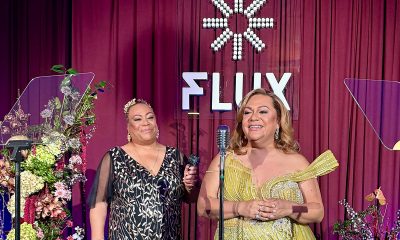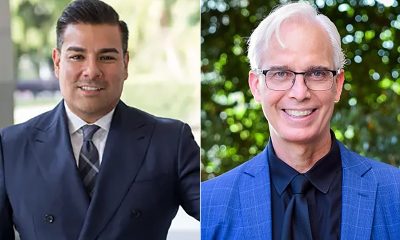Los Angeles
Equality California celebrates 20 years of legislative activism
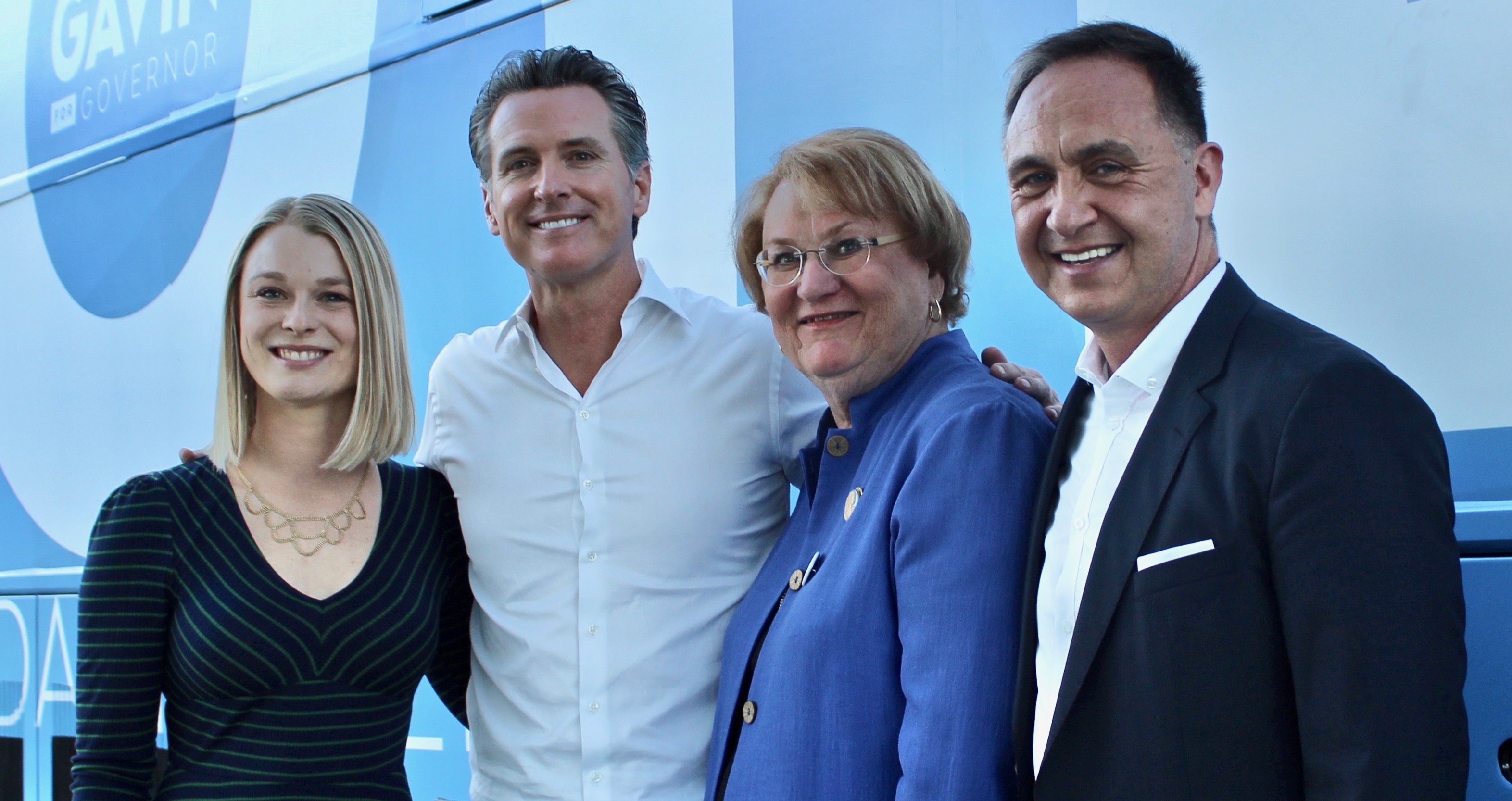
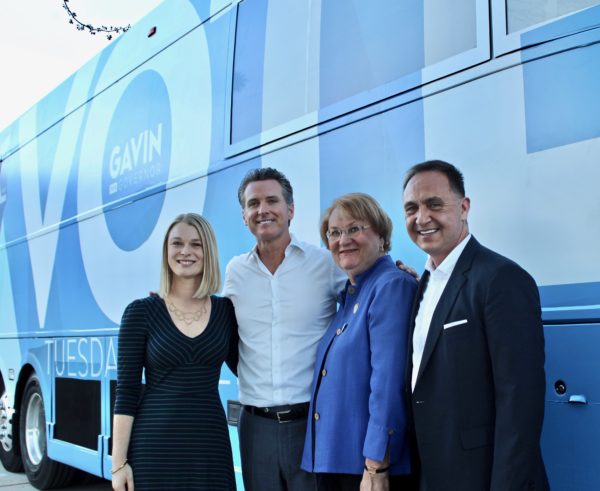
Bisexual Palm Springs City Councilmember Christy Holstege, gubernatorial candidate Gavin Newsom, trans Palm Springs City Councilmember Lisa Middleton, Rick Zbur, executive director of Equality California (Photo courtesy EQCA)
History doesn’t just make itself. History happens at an inflection point when fed up individuals come together and organize to make change. Different groups take different approaches to an issue but for change to stick, it needs to become law. This is particularly true for LGBTQ people who are still not equal to their fellow citizens under federal and many state and local laws. That’s why Equality California’s 20 years of successful legislative activism has become a model for other statewide LGBTQ civil rights organizations.
But Equality California stands on the shoulders of brave souls who paved the way through the dark, tangled thicket of entrenched and institutionalized homophobia.
California has a long track record of creating change, starting with the Mattachine Society, the Daughters of Bilitis, ONE Magazine, the Society for Individual Rights (SIR) in the 1950s. In the 1960s, gay and lesbian activism intertwined with the anti-Vietnam War, Women’s Liberation and Gay Liberation movements. But ironically, the Black Cat and Stonewall rebellions in the late 1960s also sent people “scurrying into closet” fearing exposure through police arrests at bar raids, according to attorney and businesswoman Diane Abbitt.
“There was a lot of shame. People were terrified of losing their jobs. A lot of them were teachers and professional people,” Abbitt tells the Los Angeles Blade. “And it impacted businesses. There was a lesbian bar in Redondo Beach where the police kept coming in on the pretext that they were looking for a runaway.”
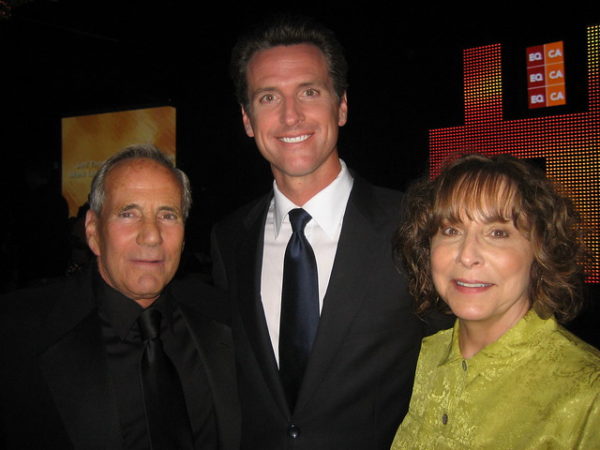
Checkbook activist and Equality California Board member Diane Abbitt, with EQCA honoree San Francisco Mayor Gavin Newsom and consultant Bob Burke in 2008. (Photo by Karen Ocamb)
By the 1970s, the fight for equal protection under the law hit the political scene and the California Legislature. In 1971, the Alice B. Toklas Memorial Democratic Club of San Francisco formed to train activists to become political professionals and engage with the Democratic Party. In 1975, Stonewall Democratic Club was founded in Los Angeles and Assemblymember Willie Brown arduously secured passage of a consenting adults law that didn’t exactly decriminalize homosexuality—sodomy or oral copulation laws remained on the books—but private consensual activity between adults over 18 was no longer illegal. In 1977, Assemblymember Art Agnos started pushing for a gay rights job bill and Harvey Milk was elected to the San Francisco Board of Supervisors. The following year, a statewide coalition of activists defeated the anti-gay Briggs initiative and Milk was assassinated.
Meanwhile in LA, the Municipal Elections Committee of Los Angeles (MECLA) became the first gay political action committee (PAC) contributing money to local pro-gay politicians. “We wanted to change the quality of life for gay people so they could be who they are – and they wanted to do that through political action,” says Abbitt, MECLA’s first female board co-chair who later served on the EQCA board and became PAC chair. MECLA became so prominent, Gov. Jerry Brown gave the keynote speech at a 1979 roast for philanthropist businessman Sheldon Andelson.
There were a record 71 openly lesbian and gay delegates to the 1980 Democratic Convention, 17 of whom came from California. The Democratic Party Platform included a gay rights plank. But Democratic President Jimmy Carter lost to former California Republican Gov. Ronald Reagan in 1980 and everything changed.
Though the first AIDS cases reported to the CDC in 1981 of five gay men from Los Angeles exploded into “1,112 and Counting,” as Larry Kramer put it in 1983, the religious conservative Reagan administration did little to nothing. But AIDS brought together the leaders of numerous LGBT groups to form LIFE AIDS Lobby to push AIDS legislation in Sacramento.
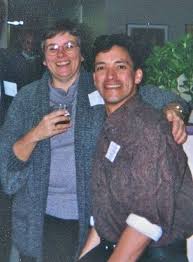
LIFE Lobby Board Co-Chair attorney John Duran and Executive Director Laurie McBride at AIDS Action event during Bill Clinton’s Inauguration in Jan. 1992 (Photo by Karen Ocamb)
LIFE worked with allies like Willie Brown and David Roberti, whose openly gay aide Stan Hadden wrote bills and coordinated the legislative response. LIFE also pushed back on anti-gay/AIDS bills and other measures such as the AIDS quarantine initiatives. John Duran, a volunteer attorney for ACT UP/Orange County, joined the LIFE AIDS Lobby board and wound up serving as co-chair from 1988-1992, working with executive director, Laurie McBride. By the time Republican Gov. Pete Wilson vetoed AB 101 in 1991, LIFE Lobby included members as diverse as transgender ACT UP/LA AIDS activist Connie Norman and Log Cabin Republican Club co-founder Frank Ricchiazzi.
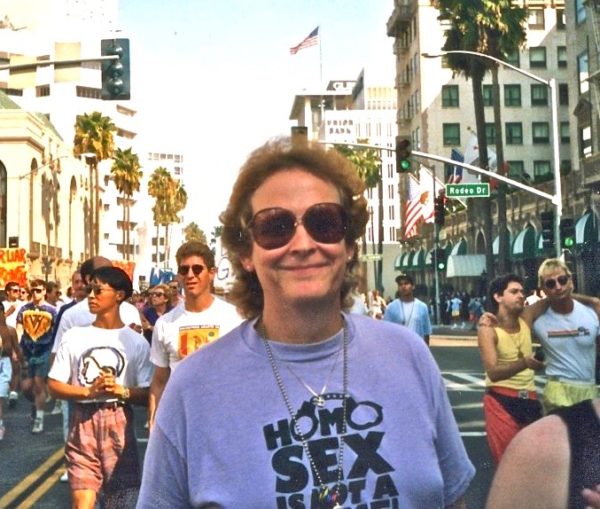
The late AIDS Diva Connie Norman marching in AB 101 protests in Beverly Hills in 1991 (Photo by Karen Ocamb)
In the 1990s, state politics was dominated by conservative anti-gay Republicans. Out attorney Sheila James Kuehl took on the challenge, becoming the first openly gay person in the California Legislature and the first member of the LGBT Legislative Caucus. But in 1998, despite the turning point of Democrat Gray Davis’s election as governor and the promise of new life-saving AIDS medications, LIFE Lobby ran out of money and folded.
But longtime politicos recognized the need for political and legislative activism and California Alliance for Pride and Equality (CAPE) quickly emerged from the ashes in 1999 with longtime San Francisco politico Jean Harris as executive director. Geoff Kors, a graduate of Stanford Law School and a lawyer in private practice, was one of nine members who sat on CAPE’s Board of Directors—which now constituted individual board members, not representatives from different statewide organizations.
When Harris left in 2003 – having helped pass Assemblymember Carole Migden’s AB 25 domestic partner registry bill and Kuehl’s AB 537, the first statewide LGBT-inclusive anti-bullying law – Kors stepped in as executive director and changed the organization’s name to Equality California.
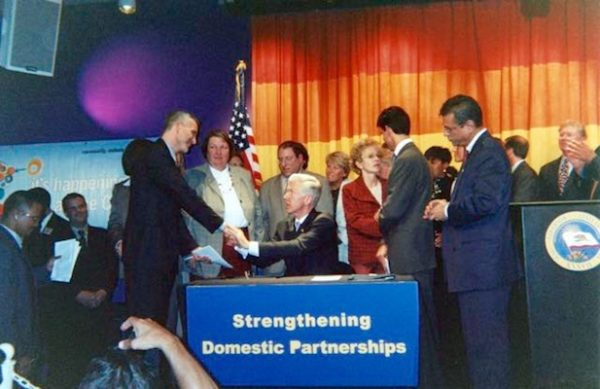
Kors grew the organization into a national model. First, in 2003, working with gay friend Assemblymember Mark Leno, they secured passage of Leno’s AB 196 adding gender identity to employment and housing protections. That year, he also helped secure passage of AB 205, Assemblymember Jackie Goldberg’s expanded domestic partnership bill that was essentially civil unions by another name.
In 2004, as the Religious Right pressured President G. W. Bush to pass a federal constitutional amendment banning gay marriage, Equality California merged with Marriage Equality California and focused on both affirmative and counter measures. In 2005, Leno’s first marriage bill, AB 849, passed the Legislature, only to be vetoed by Gov. Arnold Schwarzenegger. Marriage equality became a key gay and lesbian civil rights issue but marriage equality was upended by the passage of Prop 8 in 2008. It was eventually overturned.
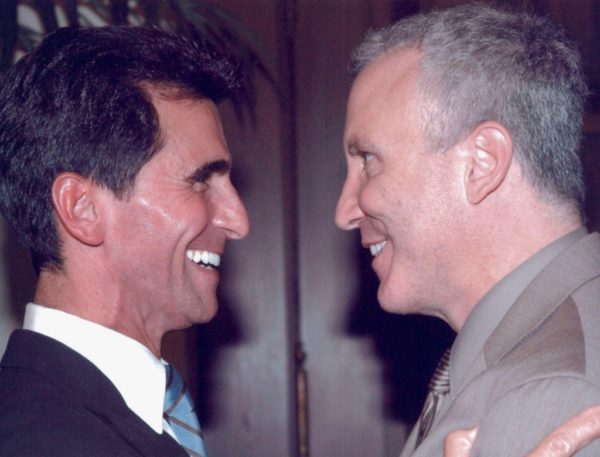
Assemblymember Mark Leno and Equality California Executive Director Geoff Kors excited over passage of Leno’s marriage equality bill. (Photo courtesy Kors)
Kors left Equality California in March 2011 after a hugely successful tenure, concluding with passage of State Sen. Mark Leno’s SB 4, the FAIR Education Act that established an inclusive curriculum.
Kors was followed by Roland Palencia, who served a year, followed by incredible ally Laurie Hasencamp, who stabilized the troubled organization, then John O’Connor who joined the organization in December 2012. During their tenures, Equality California worked to pass Ted Lieu’s SB 1172 “reparative therapy” bill to protect LGBT youth from psychological abuse; Assemblymember Tom Ammiano’s AB 1266, the School Success and Opportunity Act, protecting and prohibiting the exclusion of trans students from classes and activities; and Assemblymember Susan Bonilla’s AB 2501, prohibiting use of the “panic defense” based on sexual orientation or gender identity.
When O’Connor left, Rick Zbur, a longtime political and environment activist, retired in 2014 from his senior law partnership with Latham & Watkins to take the executive director job, which also includes working with the Equality California Institute and the community Equality Council.
Equality California has expanded, re-branded and flourished under Zbur’s leadership, broadening the scope of the organization’s mission to focus on intersectionality and look at health disparities, especially in people of color communities, and the rights of trans people and LGBT undocumented immigrants. The expansion included hiring Valerie Ploumpis as National Policy Director based in Washington DC and launching Silver State Equality in Nevada.
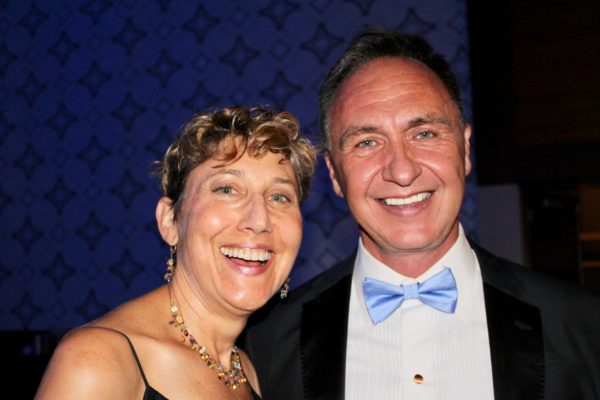
National Policy Director Valerie Ploumpis and Executive Director Rick Zbur (Photo by Karen Ocamb)
This year, Equality California had 13 bills and resolutions; seven passed the legislature; one has been signed into law; and six bills were turned into two-year bills.
“It was a challenging year for us. I’ve got to admit that. Part of that is because our bills are more challenging and in many ways, we’re tackling tougher issues that impact our community in significant ways,” Zbur tells the Los Angeles Blade. “Many of the strategies that we are pursuing cost money. So that is something that we’ve got a lot of work to do to educate the legislature about the need to prioritize our community as they’re allocating budgetary resources. We’ve got a lot of work to do next year to get those six bills passed.”
Gov. Newsom signed AB 711 by Assemblymember David Chiu. “That basically ensures that local educational agencies in California are required to update the records of their former students who identify as transgender, so that their legal name and their gender are accurately reflected in documents like high school diplomas and school transcripts.” Says Zbur.
Assemblymember Todd Gloria’s AB 493, Safe and Supportive Schools, is on Newsom’s desk but minus a key component – Mandatory Teacher and Staff Training Element, which was pulled because the budgetary funding was insufficient. “We have an agreement and understanding with the governor’s office that we will bring back the mandatory training elements of the bill next year. They made a commitment to us to work on a funding package as part of next year’s budget,” says Zbur. “We’re optimistic that the governor and his staff have actually prioritized LGBTQ school safety as an issue to tackle in sort of a comprehensive way next year.”
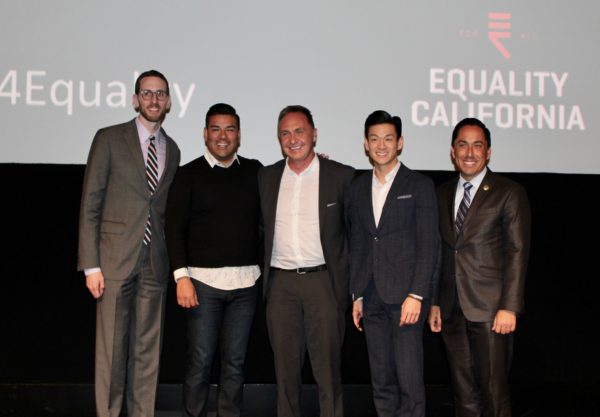
State Sen. Scott Wiener, then-Insurance Commissioner candidate Sen. Ricardo Lara, Equality California Executive Director Rick Zbur, LGBT Legislative Caucus Chair Assemblymember Evan Low, and Assemblymember Todd Gloria at an EQCA event. (Photo by Karen Ocamb)
Another major bill awaiting a signature is SB 159, PrEP and PEP Access Expansion bill by Sen. Scott Wiener. The bill “basically authorizes pharmacists to furnish PrEP and PEP to patients without a prescription, which eliminates one of the key barriers to getting coverage,” says Zbur. Now, if someone can’t get a doctor’s prescription over the weekend, PrEP and PEP is over available at an emergency room.
“That costs a lot of money and for people that have inadequate insurance, it is a huge barrier. So this bill would fix those circumstances,” says Zbur. “It also prohibits insurance companies from requiring prior authorization from insurance companies for at least that initial prescription for PrEP.”
Another bill, SB 495 by Senator Maria Elena Durazo, tackles child custody determinations, modifying the family code “to prohibit discrimination on the basis of sexual orientation or gender identity of a parent or legal guardian or relative when granting and making decisions on custody of a child, which is an important new non-discrimination protection that is now embedded in our law.”
Additionally, AB 785, by Senate Assemblymember Richard Bloom “streamlines the transfer of donor medical information for families in donor conceived individuals” is also on Newsom’s desk.
The tough two-year bills include the complicated Intersex Bodily Autonomy bill, which was pulled early to allow for more education. “Basically it protects the rights of intersex Californians to ensure that they can provide informed consent before medically unnecessary and sometimes irreversible and harmful procedures are performed on them as babies,” says Zbur. “At its core, this is about protecting and respecting an individual’s own determination of their gender identity.”
Another now-two-year bill by Senator Wiener, SB 132, the Transgender Respect Agency and Dignity Act, primarily dealing with how trans inmates are housed in prison. “We, as a coalition, elected to take a pause and work on some details on the bill that we think will allow us to get it passed next year,” Zbur says. “As you might expect, there’s a high amount of engagement with the California Department of Corrections.”
And then there was the dustup with Assembly Appropriations Chair Lorena Gonzalez, who placed Wiener’s SB 145 Sex Offender Registry bill on suspense without explanation, turning it into a two-year bill. The bill would fix the state’s discriminatory practice of treating LGBT young people differently than their non- LGBTQ peers when engaging in voluntary sexual activity
“We obviously expressed our concern about how this bill was treated. But we are planning on working with the Assembly Appropriations Chair next year and are dedicated to continuing to fight to get this through,” says Zbur.
“I think [Gonzalez] considers herself an ally. But I think she really doesn’t fully understand our issues. It’s inappropriate for her to really try to pit a bill that is trying to fix discrimination against LGBTQ people against folks in the criminal justice advocacy area, who would oppose any sort of increased criminalization of something.”
Apparently, Gonzalez hated the bill. “She wanted this gone. She had concerns about the underlying law. That’s something that she should do as a separate bill. We obviously took issue with the fact that she wanted to tie concerns that she had with the underlying law to an LGBTQ bill to fix discrimination for our community,” Zbur says.
Two other bills, SB 741 and AB 650, “got bollixed up because of some of the details,” says Zbur. One allows trans Californians to update their marriage certificates and birth certificates while still protecting their privacy and the other is about LGBTQ data collection. A third bill, AB 307, by Eloise Gomez Reyes and Senator Wiener regards a homeless youth grant program for which there was no money in the budget.
“One of the challenges that we’re facing is that many of the things that we need to do in California do cost money now,” says Zbur. “So we’ve got a lot of work to do to really hold our legislators and legislature accountable to prioritize the needs of our community. These bills are essentially a drop in the bucket compared to the broader state budget. But really, just the commitment isn’t there yet among many of the folks that are making these decisions. So we’ve got a lot of work to do and that’s what we’re going to be focusing on next year.”
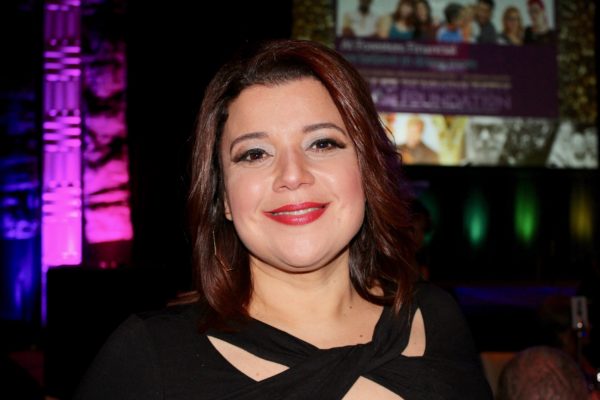
CNN commentator and outspoke Trump critic Ana Navarro (Photo by Karen Ocamb)
Zbur says their Equality California 20th Anniversary Awards on Sept. 28 at the J.W. Marriott Hotel “should be the biggest gala that we’ve ever had,” with an expected attendance of more than 1200 people. The honorees are Jill Soloway, creator and executive producer of the Amazon original series Transparent, with the Equality Visibility Award; CNN political commentator Ana Navarro with the Ally Leadership; Latham & Watkins, LLP and attorney Amy Quartarolo, who will be honored together with the Community Leadership Award – Latham & Watkins, contributed almost $3 million in free legal services to Equality California over the last three years; and past Equality California Board President Andreas Meyer, who led the organization’s board of directors from 2012-2016.
Meyer was Board president when Zbur was hired and “developed the strategy that the organization is following now—one that is very intersectional and really focused on addressing the disparities in health and wellbeing that our community faces.”
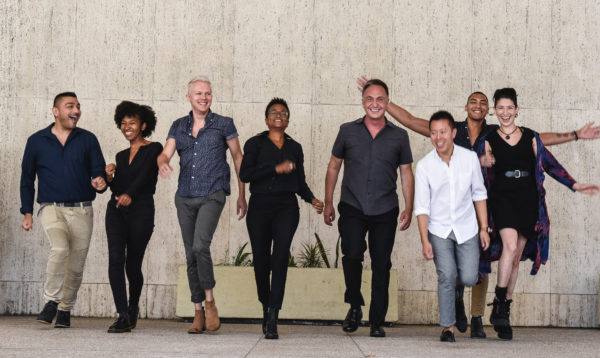
Equality California staff: From left: Program Director Robbie Rodriguez, Program Associate Marisa London, Communications Director Samuel Garrett-Pate, Director of Finance & Administration Valecia Phillips, Executive Director Rick Zbur, Managing Director Tony Hoang, Program Manager Jeremy Payne, Grants Associate Allie Hughes (Photo by Claudia Unger & Francesca Di Amico, courtesy of Equality California)
Zbur also says he is “actually very lucky to have an incredibly committed board and an incredibly committed staff. I mean it’s really a team effort. But when I came in, it was a time in which a lot of folks were asking the question: why do we need Equality California? We were so associated with the fight for marriage equality and that was behind us. Andres was an incredibly important leader of our organization during that transition,” as were Jackie Thomas and Joyce Rowland at the Equality California Institute.
“For two decades, Equality California has led the Golden State’s fight for LGBTQ civil rights and social justice,” says Zbur. “And after 20 years in this fight — even in these challenging times — I couldn’t be more hopeful. I have hope for our future because like our fledgling board back in 1999, I know the next generation of leaders are unafraid, unjaded and don’t give a damn what the cynics have to say.”
Los Angeles
A new “queer summer camp” cycling event rises from the legacy of AIDS/LifeCycle
The LA LGBT Center will host its first ever “Center Ride Out,” a 3-day community cycling adventure from Los Angeles to San Diego.

On April 24, 500 cyclists will meet at Elysian Park before dawn, stretching and preparing for a 110-mile ride through urban scenery and rolling hills. They will be part of the Los Angeles LGBT Center’s inaugural “Center Ride Out,” a 3-day journey that takes riders through Los Angeles and Temecula, reeling to a stop at the San Diego LGBT Community Center.
The cycling adventure is a rejuvenating, communal queer experience that taps into the importance of shared joy and advocacy in the fight to defend LGBTQ+ rights. Its roots are sacred for many queer elders: Center Ride Out rises from the legacy of the cherished AIDS/Life Cycle (ALC), a seven-day cycling adventure from San Francisco to L.A. that formed in 1994 and ended with its last ride in 2025.
In its 31-year run, ALC riders raised over $300 million for HIV and AIDS resources, services, and awareness. This year, Center Ride Out provides a new, exciting extension of this important event, allowing cyclers to raise funds in support of the LA LGBT Center, The San Diego LGBT Community Center, and the LGBTQ Community Center of the Desert.
This support is crucial as LGBTQ+ organizations face a new crisis: widespread defunding. In the last fiscal year, the LA LGBT Center lost $9 million in federal support, according to its CEO Joe Hollendoner. The funding raised by Center Ride Out’s participants will help offset this loss and keep the organization’s various programs and services, from gender affirming care and HIV prevention resources to LGBTQ+ senior and youth support, afloat. “We anticipate further divestment in our work by the Trump administration, [so Center Ride Out] allows people to align their own personal passions with our mission in a broader way,” Hollendoner told the Blade.
Altogether, Center Ride Out participants will cover nearly 200 miles of ground together. At the end of the first 110-mile day from L.A. to Temecula, where riders will get to look at historic landmarks and embark on a museum lunch stop together, the day culminates at campgrounds at Lake Skinner.
Here, riders can take a full rest day at their lakeside camp, where it will exude queer summer camp vibes. There will be massage and medical services, arts and crafts activities, dance parties, and time to relax and connect with the community. “Folks [can] build relationships, have some fun, and feel safe. That’s a feeling a lot of people [need] right now, especially our trans and nonbinary siblings,” Hollendoner said.
Day 3 ends with an 87-mile downhill, coastal ride through the town of Rainbow in northern San Diego County, before ending with a celebratory bash at the San Diego LGBT Community Center.
Hollendoner rode ALC five times while it was active and is excited to be part of this new legacy from its very beginning. “I’ve heard our community elders talk about how powerful it was to be at the start of AIDS/LifeCycle, and the idea that I can be here at the start of Center Ride Out, an event that I hope will go for three decades or longer…It feels really exciting to me,” Hollendoner said.
For newcomers and experienced cyclists alike, Center Ride Out aims to provide an accessible experience: paring down the initial weeklong ALC ride to three days. To take part, cyclists are expected to raise $2,500 by April 10. For those who may struggle to reach this minimum, staff members have established a community fund.
The community fund will also provide scholarships for BIPOC, trans, women, and femme participants — historically underrepresented communities at ALC — as well as microgrants for BIPOC and trans-led teams to encourage a diverse range of cyclists.
Come April, scores of queer cyclists will get to experience this adventure together: one that is both storied and fresh in its purpose, lineage, and joyful expression of queer togetherness. “Center Ride Out is providing an exciting opportunity for people to not only fight back and be in community with one another, but to build resiliency and be surrounded by people who share values around liberation,” Hollendoner said.
To learn how to register, donate to or volunteer for Center Ride Out, more information can be found here. The three-day adventure takes place from April 24 to April 26.
Kristie Song is a California Local News Fellow placed with the Los Angeles Blade. The California Local News Fellowship is a state-funded initiative to support and strengthen local news reporting. Learn more about it at fellowships.journalism.berkeley.edu/cafellows.
Los Angeles
Stonewall Young Democrats bounces back from “quiet year” with Hero Awards

On Saturday, Feb. 7, the Stonewall Young Democrats (SYD), an organization that mobilizes and fosters community for young, LGBTQ+ people, hosted its “Hero Awards” ceremony at Beaches West Hollywood. Under luminous pink light, vibrant crowds of community members showed up to support and celebrate people and organizations spearheading LGBTQ+ visibility, change, and livelihood across L.A. County. Political figures filled the venue wall to wall, including LA Mayor Karen Bass, West Hollywood Mayor John Heilman, West Hollywood Council Member John Erickson, and California Assemblymember Rick Zbur.

Several local advocates and politicians were honored for their queer advocacy and leadership, including City of Los Angeles LGBTQ+ community affairs liaison Carla Ibarra, L.A. Democratic Party Chair Mark Ramos, Congressman Mark Takano, and L.A. County LGBTQ Commission Chair Sydney Rogers. The Los Angeles Blade was also recognized with an Impact Award.
Los Angeles Blade publisher Alexander Rodriguez accepted the award. In his acceptance speech, Rodriguez shared, “We report on and share the struggles of our queer community. We also get to see the resilience and strength our community has, even in the face of adversity. We see firsthand the importance of the Stonewall Young Democrats and the amazing network of people they have put together, as seen here today.”

The Stonewall Young Democrats formed in 2004, immortalizing the 1969 Stonewall riots in its name. The decision to carry the legacies of early gay rights movements is poignant: queer resistance and their enduring battle against political and social marginalization and violence are seared into the organization’s core.
SYD’s President Kanin Pruter is keeping this link to the past alive; it’s a reminder of the interconnectedness of the queer community. “Our history is there for a reason,” Pruter told the Blade. “Without lesbians during the AIDS crisis, we would not be where we are today. And our movement was started by Black trans women.”
This recent Hero Awards marks SYD’s revitalization. After a relatively quiet year, its board is excited to grow its organization, recruit diverse and eager LGBTQ+ folks, and create fruitful opportunities for everyone in the organization to develop their political advocacy and organizing skills.

Most importantly, Pruter hopes that SYD can be a safe, inclusive, and accessible space for any LGBTQ+ person who has felt outcast before. “In a loving and joking way, we’re an island of misfit toys,” Pruter said, who is intentional about creating environments where queer folks who have experienced trauma, isolation, and exclusionary social politics can fit in and belong.
“I want folks to be open, vulnerable and leave any preconceived notions at the door. We come in here [and] we are who we are. We respect each other’s identity, and we’re here to foster a culture where everyone feels welcome.”
Pruter encourages young LGBTQ+ people who are interested in getting involved in SYD, to contact him and learn more about the organization. More information can be found here.
Kristie Song is a California Local News Fellow placed with the Los Angeles Blade. The California Local News Fellowship is a state-funded initiative to support and strengthen local news reporting. Learn more about it at fellowships.journalism.berkeley.edu/cafellows.
Los Angeles
Project Angel Food is now able to feed 10,000 people daily with expanded building
On Thursday, community gathered to celebrate Project Angel Food’s new kitchen and campus building, which allows them to serve more of the county’s critically ill community.
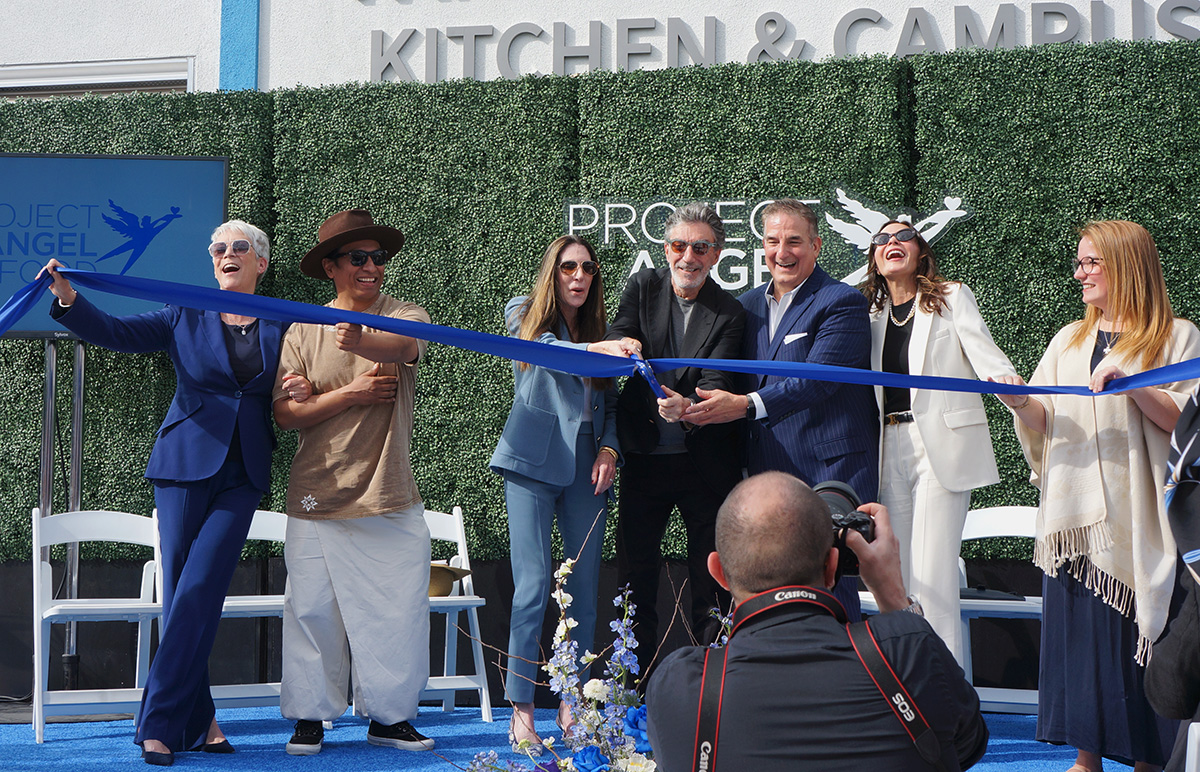
On Feb. 5, community members gathered at 922 Vine Street to celebrate the expansion of Hollywood-based non-profit Project Angel Food. That Thursday morning, the organization cut the ribbon for its Chuck Lorre Family Foundation Kitchen and Campus: one of two new buildings that greatly increase its capacity to provide healthy food and nutritional resources to the county’s critically ill community members.

Project Angel Food was founded in 1989 by author and activist Marianne Williamson and blossomed from a dire need to feed people impacted by HIV/AIDS during the epidemic. Today, the organization cooks and delivers over 1.5 million meals, tailored to specific needs that include chronic illnesses and gastrointestinal issues, to 5,000 people across Los Angeles.
In August 2023, the organization launched its “Rise to the Challenge” campaign, a multi-year expansion and renovation project backed by $51 million. Now, its first phase is complete, and its impact is expected to double.
With the new Chuck Lorre Family Foundation Kitchen and Campus, Project Angel Food’s kitchen staff — which, like the rest of the organization, is majorly powered by volunteers — has access to 16,000 square feet of expanded space, which includes more ovens, walk-in freezers, and hot cook lines than they’ve ever had access to previously. Project Angel Food CEO Richard Ayoub explained today that this will allow staff and volunteers to serve 10,000 people a day.
The organization’s executive chef, John Gordon, explained to the Blade that “space issues” were a major hindrance previously. Before the new kitchen was opened, staff worked out of a much smaller Lincoln Heights facility. “If you didn’t get the rack, you don’t have the sheet pans. If you got the sheet pans, you don’t have the last chiller,” Gordon said, explaining how difficult it was before to balance multiple tasks in the same space. Now, their team of seven chefs, 12 kitchen assistants, dishwashers, and volunteers can work in several cook lines at the same time.
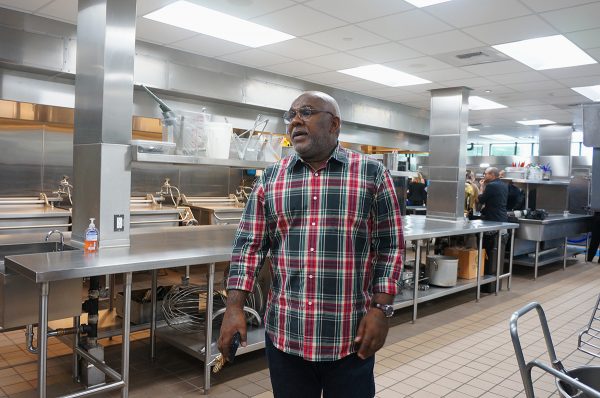
“We’re much more efficient this way,” Gordon continued. In the kitchen, the day begins at 8 a.m. Someone will pick music for the morning, setting a groove for staff as they sync up to review recipes, pack meals prepared from the day before, and cook meals for the next day ahead. After a lunch break, they continue to work until 4 p.m. to make sure they’re meeting the needs of the community they serve.
For locals like Celeste, a Project Angel Food client who is affected by multiple sclerosis, this service is crucial. On days the disability “really takes effect,” being able to receive nutritious meals customized to her needs makes a meaningful difference. “Some days, I’m not able to get up,” Celeste said. “Just that one meal [can] give me an extra boost [and] allow that sun to shine brightly even on my rainy days.”
For advocates and Project Angel Food supporters, Thursday’s celebration was also an act of resistance and a bold declaration against the federal administration. Jamie Lee Curtis, the honorary co-chair of the “Rise to the Challenge” campaign, spoke of the “love” that lay at the core of Project Angel Food’s foundation: a kind of love she finds completely absent in the federal administration.
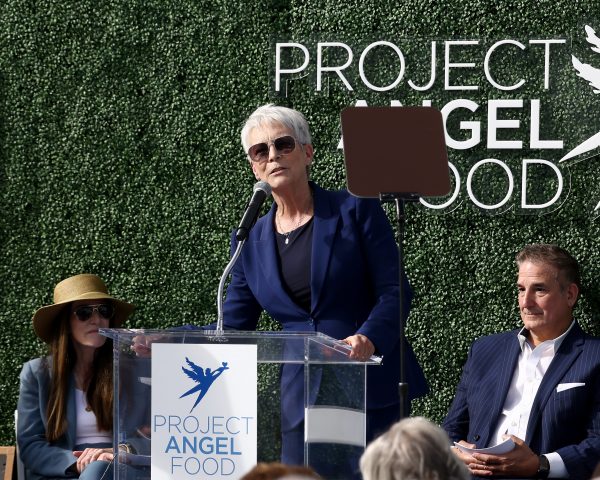
“We are a community here today the same way they are in Minnesota, and I feel like what they’re doing is what we’re doing,” Curtis said to the crowd, defiance firm in her voice. “And we’re only going to get any shit done if we do it together and defy these motherfuckers.”
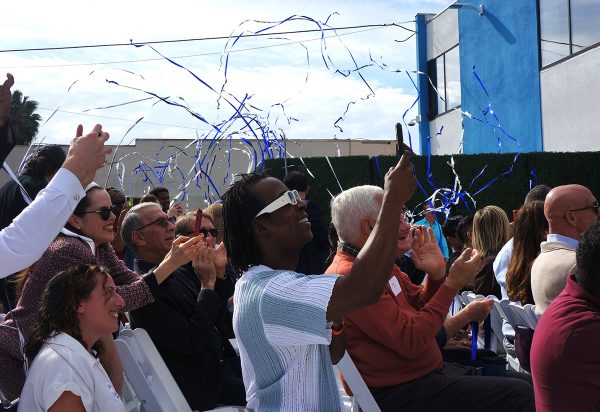
County supervisor Lindsey Horvath, a former delivery volunteer at Project Angel Food, affirmed this statement and guaranteed the county’s continued support in the organization. Horvath spoke of the government’s “glaring absence” during the HIV/AIDS epidemic: one that is “eerily similar” to its attitude now.
As the government mobilizes Immigration and Customs Enforcement (ICE) agents, sending immigrant communities spiraling into crisis, on-the-ground organizations like Project Angel Food are standing in firm support of their marginalized and ill community members. Horvath’s confirmation of county support is also rooted in this mission.
The building’s exterior also reflects the organization’s dedication to its residents. On the south side, a new large-scale mural painted by esteemed local muralist Robert Vargas highlights the stories of local volunteers and vendors who live and work in the neighborhood. Vargas explained that seeing these people in action “crystallized” the dedicated service and harmony that exists among the organization’s volunteers, clients, staff, and nearby community members.
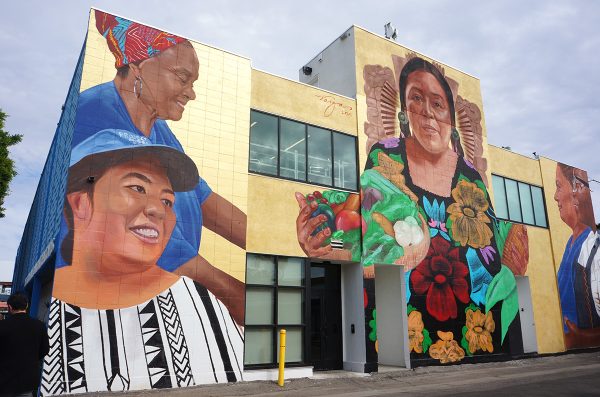
Next, the second building of the Chuck Lorre Family Foundation Kitchen and Campus begins construction this summer. This space will house the organization’s nutrition, volunteer, and client services and will also include its first department dedicated to research and policy. There will also be a training kitchen, where clients will be able to learn how to cook meals on their own.
As Project Angel Food’s growth continues, Ayoub hopes community members who are able to pitch in will do so. While public funding can feel unsteady, he explained, community strength and sustainment can fill those gaps of doubt. The organization is $2.3 million away from its goal in securing capital for this second building, and Lorre will match donations up to $1.5 million.
Kristie Song is a California Local News Fellow placed with the Los Angeles Blade. The California Local News Fellowship is a state-funded initiative to support and strengthen local news reporting. Learn more about it at fellowships.journalism.berkeley.edu/cafellows.
Los Angeles
Community members urge city council to invest in trans lives
Advocates introduced the TGI Wellness and Equity Initiative, a campaign that would direct crucial funding to trans, gender expansive and intersex community organizations.
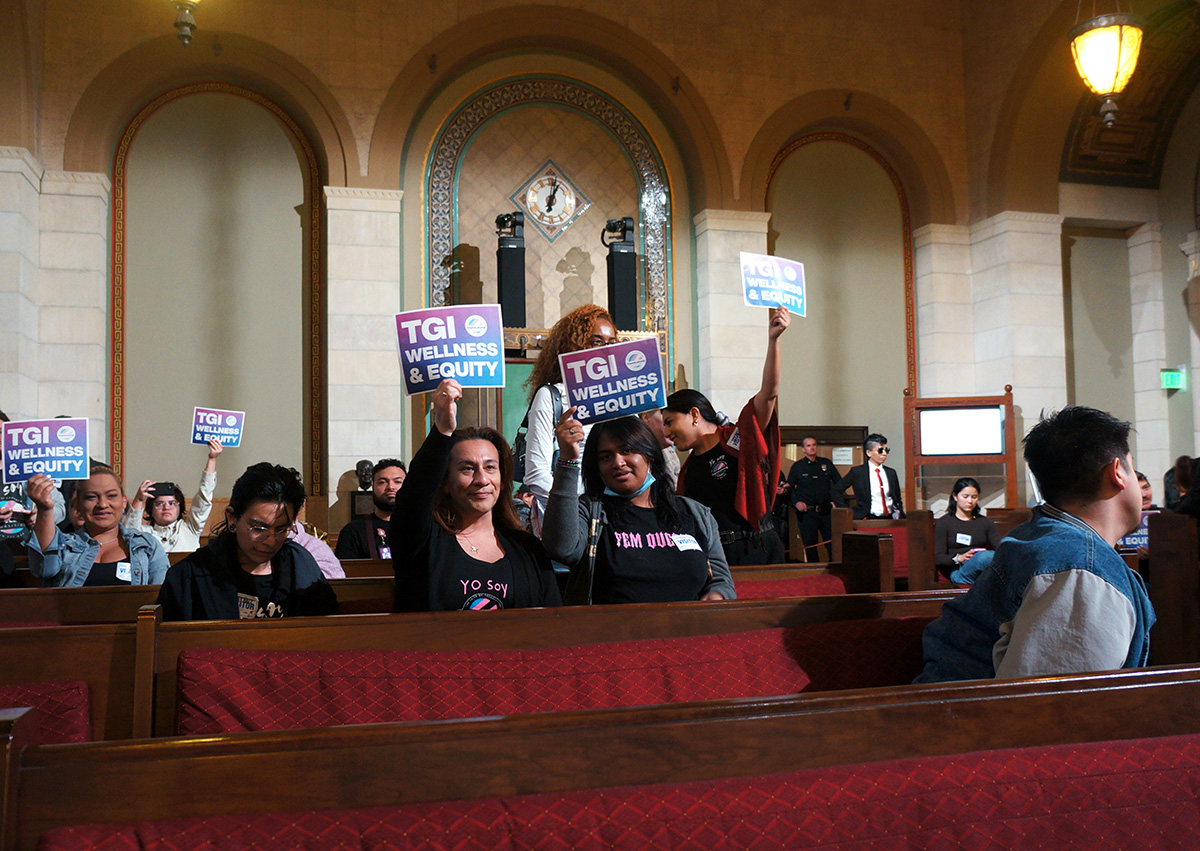
At 9 a.m. on Tuesday, ahead of L.A.’s regular city council meeting, a long procession of people wrapped around the entrance leading into the council chamber. Someone remarked that it was “unprecedented” to see so many people gathered, waiting to get inside. Several housing advocates and legal experts were waiting to make public comments about Measure ULA, otherwise known as the county’s “mansion tax.”
Another fifty or so transgender, gender expansive and intersex (TGI) advocates from the TransLatin@ Coalition (TLC), a long-standing organization that provides housing and meal support, legal services, mental health guidance and peer support groups, showed up to demand real, tangible support on behalf of themselves and their community members as the Mayor prepares the city’s budget on how funds will be allocated.
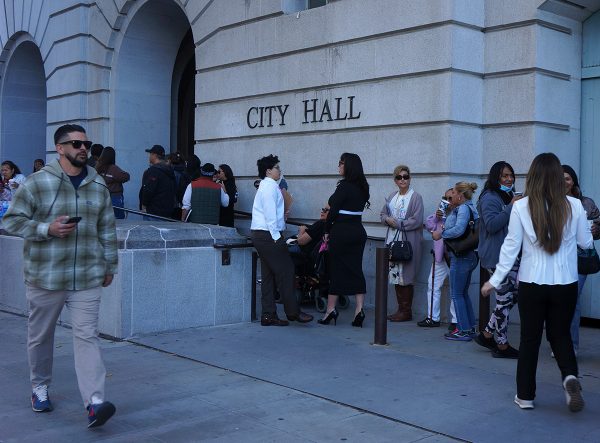
TLC advocates called on the city council to invest in their TGI Wellness and Equity Initiative (TGI WE), a two-year pilot program that would provide $4 million to five organizations that support the safety and rights of local TGI people. This money would expand each organization’s ability to hire more staff and expand their outreach, resources, and ability to serve a continually underserved community: TGI Angelenos who are multiply marginalized as violence against trans people and immigrants continues to increase.
During public comment, TLC president and CEO Bamby Salcedo requested that the council move forward with the initiative. Aside from general support, she asked that two council members act as co-sponsors and petitioners for the initiative. This way, TGI WE can be added as an official agenda item for future city council meetings, which would get the ball rolling for the initiative’s funding goals.
“Right now is the time to stand in solidarity with our community and stand against the federal government, who is attacking and trying to disappear trans people,” Salcedo told council members. Several other advocates, including TLC policy ambassador ChiChi Navarro, Christopher Street West board member NiK Kacy and Invisible Men director Jovan Wolf delivered passionate statements in support of TGI WE.
“Los Angeles is in a state of crisis, and our communities are running out of time,” Navarro told the council. They also spoke to the county’s growing investment in LAPD, while TGI organizations receive nothing. “This is not a resource shortage. It is a resource allocation choice [that] is costing lives. We need this council to introduce the TGI Wellness and Equity initiative immediately…We cannot wait. We need urgent investment today.”
TGI WE would fund community-run organizations that focus on individualized care that is facilitated with language support and sensitivity training, a kind of care that is crucial for TGI community members who often face criminalization and discrimination at the hands of law enforcement agents.
“We are their lifeline, and we demand your support,” Jovan echoed. “It’s time for the city of L.A. to make good on its promises to be for everyone…You and all of us know that we have been marginalized, pushed to the sidelines, and we continue to be an afterthought in your budgets and your agendas.”
When the meeting concluded, TLC members rallied together for a demonstration, calling out: “Support trans lives!” as council members filed out of the chambers.
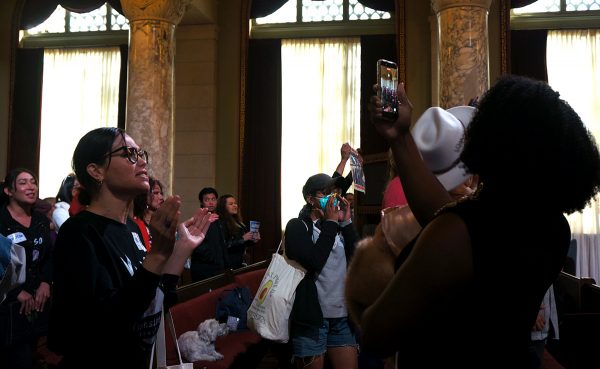
On the quiet walk back onto the street outside, Navarro reflected on the importance of this meeting and the effort community members made to be there. “A lot of the time, not just city council, [but] groups in general tend to forget trans people,” Navarro told the Blade. “Trans people are here. You saw today: clearly, we’re not a small pocket. I think we have to show them: we’re here [and] we’re not going anywhere.”
“It’s not great to be left in a place where you’re expected to continue to do the work, but without any actual support,” Navarro continued. Besides concrete funding, official citywide support for TGI WE would affirm that elected officials are willing to take a stance and take meaningful action when it comes to supporting TGI community members. “So it’s not just the money,” Navarro said. “L.A. has a motto, [that] L.A.’s for everyone. But I don’t know how you can say that when you’re not doing everything in your capacity to protect everyone.”
Kristie Song is a California Local News Fellow placed with the Los Angeles Blade. The California Local News Fellowship is a state-funded initiative to support and strengthen local news reporting. Learn more about it at fellowships.journalism.berkeley.edu/cafellows.
Los Angeles
UCLA’s long-standing LGBTQ+ alumni organization welcomes new president
The Blade sat down with paralegal studies professor and local advocate Bobby Rimas to talk about intersectional leadership and his goals for the UCLA Lambda Alumni Association.

As a young student studying history at UCLA, Bobby Rimas was grounded by his growing desire to give back to his community. He worked as a tutor for low-income students and became invested in learning about the ways intersectionality impacts people’s access to education and resources. “My barriers may not be the same as yours, and your barriers may not be the same as mine,” Rimas told the Blade. “How do you apply that in leadership [and] in the classroom?”
After 15 years of service to UCLA’s various alumni networks, first beginning with the Pilipino Alumni Association, Rimas became president of the university’s Lambda Alumni Association on Jan. 1. The UCLA Lambda Alumni Association was formed in 1989 as a way to support LGBTQ+ students and graduates with professional development, scholarship opportunities, mentorship, and other outreach support.
UCLA has long been a local epicenter of queer activism and advancement. Students formed groups like the Gay Student Union and Lesbian Sisterhood in 1969 and 1973, respectively, to empower and connect queer students. Queer art and culture also thrived in this time, as students saw the launches of the queer campus paper, magazine, and a film festival that centered on LGBTQ+ stories.
Administratively, campus officials were taking a stance against LGBTQ+ discrimination. In 1975, UCLA Chancellor Charles E. Young banned departments and programs from discriminating on the basis of sexual orientation.
In the decades since, leaders like Rimas are working to preserve this history and also build upon it. How can we inspire students in and out of the classroom? How do we make sure they have access to valuable resources and can advocate for themselves in places that are not always inclusive of their needs and identities?
Rimas often ponders these questions, both as president of the Lambda Alumni Association and at Cal State LA, where he works as an associate professor of paralegal studies. There is often cross-pollination in the concerns he receives from alumni members as well as his students: How do they find employers who are accepting of LGBTQ+ people? How do they avoid being discriminated against in the workplace?
These are questions Rimas hopes to tackle more in his role as president of the UCLA Lambda Alumni Association and in his continued tenure as an educator. One of his first goals is to expand the board and bring on more diverse perspectives to the organization. “More people means more activity,” Rimas said, who hopes that the combined knowledge and resources of the board can better serve students and alumni.
Rimas also hopes to throw a large Gala event, one that mirrors the extravagant, celebratory 2019 bash he organized for the association when he was first brought onto the team. 100 people attended, creating a wave of awareness for the organization and increasing their scholarship funding.
What’s next? UCLA Lambda Alumni Association’s first board meeting is this upcoming Monday. Rimas hopes to discuss strategies to grow the organization’s presence beyond the campus’ reach, in other queer cornerstones like West Hollywood, elevating diverse LGBTQ+ voices, and improving ways they can professionally support their network’s members.
Kristie Song is a California Local News Fellow placed with the Los Angeles Blade. The California Local News Fellowship is a state-funded initiative to support and strengthen local news reporting. Learn more about it at fellowships.journalism.berkeley.edu/cafellows.
Los Angeles
South L.A. celebrated Black joy and resistance at yesterday’s Martin Luther King Jr. Day Parade
The Blade also sat with staff from Center South, a community site that champions the safety and health of South L.A.’s LGBTQ+ communities of color.
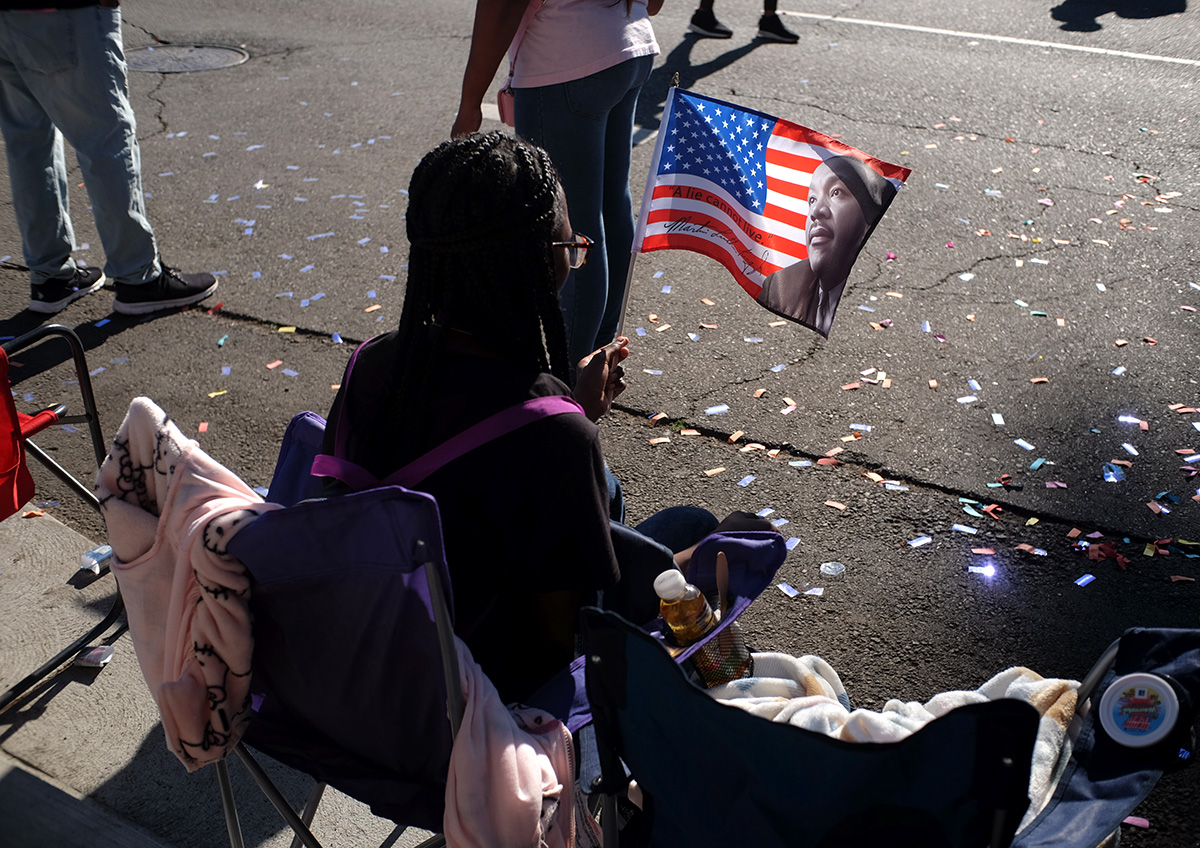
At 9 a.m. on Monday, Jan. 19, South L.A. community members gathered on the streets, holding onto lawn chairs and the hands of their children and family members. “Good morning,” one greeted. “Are you ready for the parade?” Neighbors laughed and hugged underneath the warm morning sun, staring into the horizon in anticipation of the county’s official Martin Luther King Jr. Day Parade, organized by Bakewell Media and the Los Angeles Sentinel Newspaper.
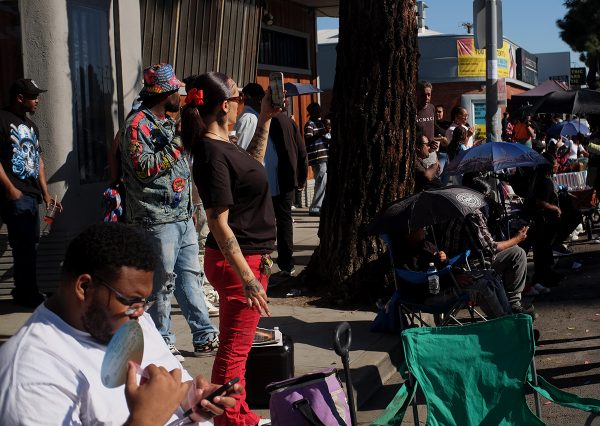
When the parade began an hour later, organizations like labor union SEIU Local 721, civil rights group Black Lives Matter Los Angeles, and HIV care and advocacy nonprofit AIDS Healthcare Foundation marched to cheers and waves from the crowd. Young musicians, drill and cheer teams from Marcus Garvey School and other schools stepped in unison, performing elaborate routines and sending jolting, infectious waves of drum and trumpet like electricity through paradegoers.
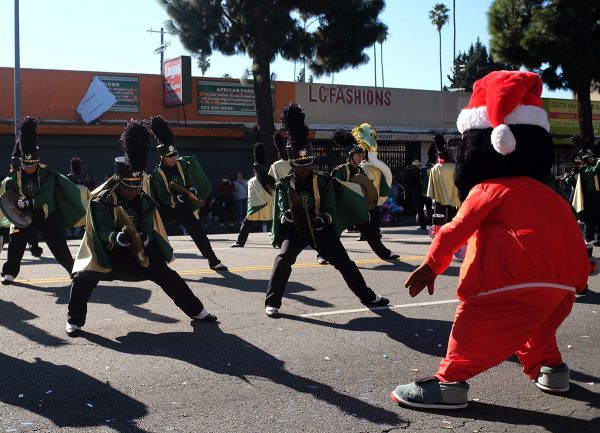
Black liberty and joy coalesced with a call to face injustice at yesterday’s festivities. Black Lives Matter Los Angeles members handed out flyers demanding accountability for Keith Porter, who was killed by an off-duty Immigration and Customs Enforcement (ICE) agent on Dec. 31. Marchers also waved the Iranian flag in solidarity with its people, who have faced increasing state-sanctioned violence after they began protesting the government in the midst of an economic downfall.
Communal care and empowerment remain, for many, the only way forward as trust in broader governmental systems and structures wanes. While celebrating the monumental work of the late civil rights activist, community members yesterday echoed an important, resonant message: The work is not yet done.
This community work is largely supported by local advocates and organizations like Center South: one of the Los Angeles LGBT Center’s community sites. Yesterday morning, ahead of the parade, senior program manager Steven Campa and fellow staff members welcomed people into the space for coffee and pastries.
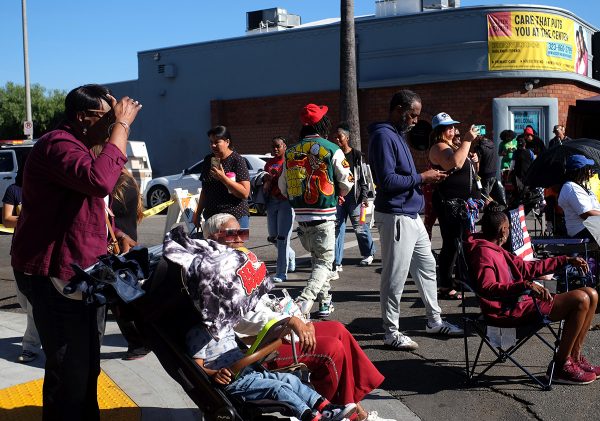
They also handed out flyers introducing residents to the site’s resources, which include: hygiene kits, HIV testing, a free monthly farmers market and clothing closet, mental health and primary care services, substance use and recovery programs, as well as social groups that prioritize LGBTQ+ people of color living in the neighborhood.
Center South opened six years ago, reclaiming a space that once housed a vibrant jazz supper club. At first, the site focused on providing services specifically for men who have sex with men (MSM), regardless of whether or not they identified as a member of the LGBTQ+ community. Over time, Center South became more inclusive of and responsive to the local community as a whole, becoming a safe space for anyone in South L.A. seeking refuge and care.
Campa, who has been with Center South since its founding, emphasized the constantly-evolving nature of the place as it molds itself to best serve and represent its community. Staff members and clinicians are nurtured by their own personal connections to the neighborhood, yearning to give back to the place that raised them.
And that has an effect. “How does it look to have a provider who’s queer: a provider that looks like folks in the community?” Campa said. “We’re our community. Folks grew up [here]…To speak to the MLK Day parade, this was a holiday for the Center. Folks chose to be here. Understanding that we are on MLK Boulevard, we want to continue to do [show up] every year to provide a safe space for the community.”
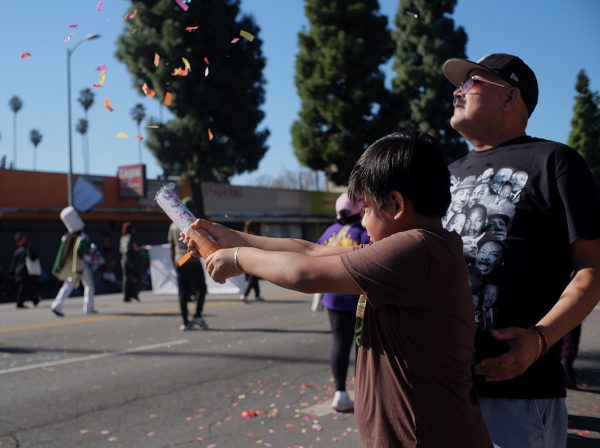
Campa, his staff members, and fellow Los Angeles LGBT Center staff want to expand what it means to be safe and healthy — and to see that reflected more broadly in their communities. “A healthy person needs medical care [and more],” said the Center’s chief equity officer, Giovanna Fischer, who showed up on Monday to celebrate the parade with the community. “[They also] need food access, immigration support…That’s definitely going to impact their health and wellbeing,” Fischer told the Blade. “
Campa, Fischer, and other advocates are strategizing for their community in uncertain times, as threats to instrumental funding are seemingly always on the table. But as they “forecast for the future” and continue to build a collective vision that uplifts LGBTQ+ people of color, their fight endures. “We deserve to think about where we want to go,” Fischer said. “We deserve the opportunity to dream and scheme, and so does our community. So until further notice, we’re going to continue to do that.”
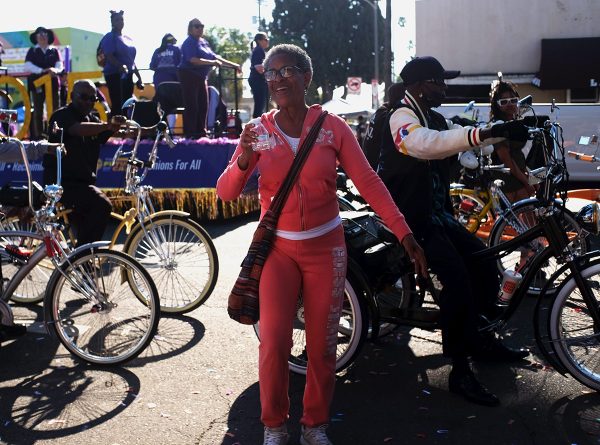
Kristie Song is a California Local News Fellow placed with the Los Angeles Blade. The California Local News Fellowship is a state-funded initiative to support and strengthen local news reporting. Learn more about it at fellowships.journalism.berkeley.edu/cafellows.
Los Angeles
Advocates demand that trans youth be protected as cases are argued in Supreme Court
This week, LGBTQ+ advocates and legal experts spoke in support of trans youth as two Supreme Court cases challenge their rights and safety.

This Tuesday, the Supreme Court heard oral arguments regarding two cases about transgender girls in sports: Little v. Hecox and West Virginia v. B.P.J.
In 2020, Idaho Governor Brad Little signed into law HB 500, which bans transgender girls and women from participating in school sports. This affected the first case’s respondent: transgender student athlete Lindsay Hecox, who was barred from participating in the track and cross country teams as well as intramural soccer and running clubs.
In 2021, then-governor of West Virginia, Jim Justice, approved HB 3293, which enacts a similar ban. Becky Pepper-Jackson (B.P.J.), now an incoming high school student, opposed the discriminatory policy when it prevented her from joining her then-middle school’s cross country and track and field teams. Pepper-Jackson has also only undergone female puberty due to gender-affirming care, but West Virginia argues that its anti-transgender policies should be upheld because of her assigned sex at birth.
For LGBTQ+ advocates and allies, these cases illustrate the burden and harm transgender people face daily as their rights to privacy, dignity, care, and inclusion are constantly at risk of being eroded and stripped completely.
Experts also wonder if these cases could potentially reshape the Constitution’s Equal Protection Clause as well as the civil rights law, Title IX. The former prohibits discrimination on other factors aside from race, though governments have argued that certain “suspect classifications” can be looked at more closely through “heightened scrutiny.” The latter prohibits sex-based discrimination in federally-funded schools.
What is unfolding and how local advocates are informing change:
The fight ahead is weary, and experts are certain that the states involved will not concede their points. In a webinar organized yesterday by the Williams Institute, several LGBTQ+ policy experts, including Rutgers Law School professor and anti-discrimination scholar Katie Eyer, examined where these cases may be heading, as well as efforts to muddy the arguments.
“It seems possible that the court might try to sidestep that issue here by saying that these laws don’t target transgender people at all,” Eyer said. “I think for most people, this seems bananas: like an upside-down world. We all know these laws were about transgender people.”
Jenny Pizer, an attorney for the LGBTQ+ civil rights legal organization Lambda Legal and a co-counsel member for the B.P.J. case, affirmed this sentiment at a press conference organized Tuesday by Lambda Legal and AIDS Healthcare Foundation affinity group, FLUX. “They’ve gone to great lengths to say there’s no discrimination,” Pizer said. “[They’re arguing] it’s just technicalities or classifications.”
Eyer was one of three Equal Protections scholars who filed an amicus brief to be considered in the Supreme Court cases. An amicus brief is a legal document submitted by someone who is not involved directly in a case but who may offer additional perspectives and information that can inform the ruling process.
Eyer’s brief provided historical context that clarified the disadvantages of blanket sex-based policies. These types of laws, according to Eyer, uphold stereotypes over nuance, truth, and equal protection guidelines. For Pepper-Jackson, who has only undergone female puberty and who does not “benefit” from what dissidents define as a sex-based competitive “advantage,” the state should have provided her the ability to argue that she should have the same rights as other girls.
“Of course, the state hasn’t done that here,” Eyer said. “Under these precedents, the Supreme Court should invalidate the laws as applied to those trans girls who really don’t have a sex-based competitive advantage.”
Who are these bills protecting?
The states argue that their policies are merely “ensuring safety and fairness in girls’ sports.” But queer advocates understand that this is a veneer for the exclusion of transgender people from society. Forcing trans youth out of sports “does not protect anyone,” according to California LGBTQ Health and Human Services Network director Dannie Ceseňa, who spoke at Tuesday’s press conference.
“It encourages the scrutiny of children’s bodies. It fuels gender policing, and it creates hostile school environments — not safer ones,” said Ceseňa. “Our youth should not inherit a world that treats their existence as a threat.”
Transgender people are systemically disempowered
At yesterday’s webinar, Distinguished Visiting Scholar at the Williams Institute Andrew Flores discussed his own amicus brief in support of Pepper-Jackson. The brief highlights the need for “heightened judicial scrutiny” in Pepper-Jackson’s case because the majority of political processes “systemically fail” transgender people.
For example, the transgender community faces substantial barriers in exercising their voter rights because of voter identification laws and other policies that regulate and define identity. “Even being able to gain access to the franchise is a burden for transgender people,” Flores said. “The court does play an important role there. It can grant legitimacy to arguments…or at least [acknowledge] that these issues are more complicated than maybe how they’ll receive them.”
What’s next?
Experts are hesitant about where the cases stand. “Bottom line: I don’t know what the court is going to do in these cases. They may send them back down for further development,” Pizer said, who thinks future rulings will not shift more overarching policies regarding transgender rights. “I think they will probably decide based only on laws about sports, not laws more broadly about the rights of trans folks.”
But whatever is decided, the impacts will trickle down to everyone. While the cases deal specifically with anti-transgender policies, experts warn that LGBTQ+ issues have always been tied to racial, economic, and disability justice. “There’s this looming constitutional campaign to really undermine civil rights,” said Eyer. “That affects LGBTQ people. It affects people of color. It affects people with disabilities. It affects everybody, and it really is concerning.”
As transgender inclusion and safety are being argued on the largest legal stage, advocates are asking: “When are you going to step up?” They are also sending a direct message to transgender youth: “We see you, we believe in you, and we are fighting for you,” said Ceseňa. “You deserve joy, community, and care. You deserve a future that reflects who you are and not who anyone or any politician demands you to be. Trans youth deserve better.”
Kristie Song is a California Local News Fellow placed with the Los Angeles Blade. The California Local News Fellowship is a state-funded initiative to support and strengthen local news reporting. Learn more about it at fellowships.journalism.berkeley.edu/cafellows.
Los Angeles
AIDS Healthcare Foundation will celebrate its legacy of food relief at the New Year’s Rose Parade
This Thursday, AHF will march at the Rose Parade in celebration of its “Food for Health” program: an initiative that has fed community members in need for five years.

This Thursday, the AIDS Healthcare Foundation (AHF) will march in the highly-anticipated Rose Parade in Pasadena. AHF will present a Jack and the Beanstalk float with the titular character climbing amongst ginormous tomatoes, eggplants, strawberries, and tomato plants. It’s befitting of this year’s parade theme: “The Magic in Teamwork,” which celebrates the power of collective effort and unity.
The whimsical design also honors the organization’s “Food for Health” program, an initiative that began in 2021 to respond to food insecurity across the U.S. For nearly five years, “Food for Health” has hosted free food pantries and farmers’ markets, providing hot meals and fresh groceries nationally for families and veterans in need of food assistance.
“Food for Health” was also crucial in the wide-sweeping emergency response various nonprofits were trying to organize after the devastating Palisades and Eaton Fires in January. AHF’s program delivered over 75,000 hot meals to evacuees and Los Angeles Fire Department (LAFD) first responders.
The float also honors the individuals fueling these on-the-ground efforts, like Janet and Christy Lee, the sisters behind Altadena’s Fair Oaks Burger. For eight months after these major fires broke out, the Lee sisters worked closely with “Food for Health” to host free weekly farmers’ markets in the parking lot of their restaurant to support community members who had been displaced and impacted by the wildfires.
Both sisters will join fellow local advocates and leaders like labor activist Dolores Huerta, LAFD Captain Thomas ‘Kit’ Kitahata, Champions of Caring Connections executive director Bettye Randle, and “Food for Health” directors Carlos Marroquin and Tara O’Callaghan as riders on the AHF float.
The Rose Parade begins at 8 a.m. on Thursday morning, marching through 5 miles of Colorado Blvd. Now in its 137th year, the parade’s inaugural event was held in 1890 and continues to delight local residents and usher in the new year with illustrious musical performances and grand floats. More information about tickets and parade guidelines can be found on Pasadena’s Tournament of Roses website.
Kristie Song is a California Local News Fellow placed with the Los Angeles Blade. The California Local News Fellowship is a state-funded initiative to support and strengthen local news reporting. Learn more about it at fellowships.journalism.berkeley.edu/cafellows.
Los Angeles
Recent L.A. County report reveals record number of hate crimes against transgender and nonbinary community members
The county’s Commission on Human Relations (LACCHR) released its annual hate crime analysis, revealing a rising violence against LGBTQ+ Angelinos.

Last Thursday, Los Angeles County’s Commission on Human Relations (LACCHR) released its 2024 Hate Crime Report, which analyzes data compiled from over 100 reporting groups, including local law enforcement agencies, educational institutions, and community-based organizations like the TransLatin@ Coalition. In its 45-year history of compiling these reports, the LACCHR recorded an “unprecedented” amount of hate crimes in this most recent analysis.
The report states that there were 102 anti-transgender crimes, “the largest number ever documented in this report.” 95% of these reported incidents were violent.
Part of the reason for this increase in reported crimes is the expanding outreach LACCHR is trying to create with partner organizations, ensuring that queer community members feel increasingly safe in reporting crimes that have been committed against them. These “grassroots efforts” have proven invaluable in building community trust, according to Dr. Monica Lomeli, who leads the production of LACCHR’s annual hate crime report.
“For the LGBTQ community, [there’s] a history of not being heard, not being believed or being misgendered,” Lomeli told the Blade. “I remember us working with a lot of different law enforcement agencies [and] victims would tell us: ‘They keep misgendering me. They don’t believe me. They keep having me make different reports.”
Lomeli stresses that, for those who feel unsafe reporting hate crimes to law enforcement agents, there are other options. One of these pathways is the commission’s community-centered initiative and reporting system, LA vs Hate, which allows people to report hate crimes and access resources like multilingual reporting guides. There is also 211 LA, a program funded by the commission that provides free, confidential support in 140 languages.
The report is instrumental to the formation of initiatives focused on queer safety and is also a resource to various LGBTQ+ organizations as they track violence committed against their community members. But the collection of this data has not been smooth, especially in this current administration.
Lomeli explained that, earlier this year, the now-defunct Department of Government Efficiency (DOGE) reached out to various human rights organizations, including the LACCHR, and was aiming to gain access to and shut down the commission’s hate crime database. “There was an attempt to bring down our data,” said Lomeli, who described these attempts as an infringement on the general public’s ability to access the report’s findings.
Moving forward, the commission’s Network Against Hate Crime, which hosts quarterly meetings with leaders from law enforcement agencies, advocacy groups, educational institutions, and social services providers, will hold a briefing on the report and discuss collaborative solutions to support community members.
Lomeli hopes to bring LGBTQ+ issues to the “forefront” of one of these upcoming meetings, given the high number of hate crimes committed against queer community members that were highlighted in the report. LA vs Hate will also continue to host campaigns, marketing efforts, and awareness events to promote the equitable treatment and safe existence of queer and other marginalized Angelinos.
Kristie Song is a California Local News Fellow placed with the Los Angeles Blade. The California Local News Fellowship is a state-funded initiative to support and strengthen local news reporting. Learn more about it at fellowships.journalism.berkeley.edu/cafellows.
Los Angeles
LGBTQ+ community calls out Radio Korea over host’s homophobic comments; station acknowledges but skirts accountability
On Nov. 3rd, Radio Korea host Julie An claimed that “gay people began the spread of AIDS” on a talk show broadcast by the station.
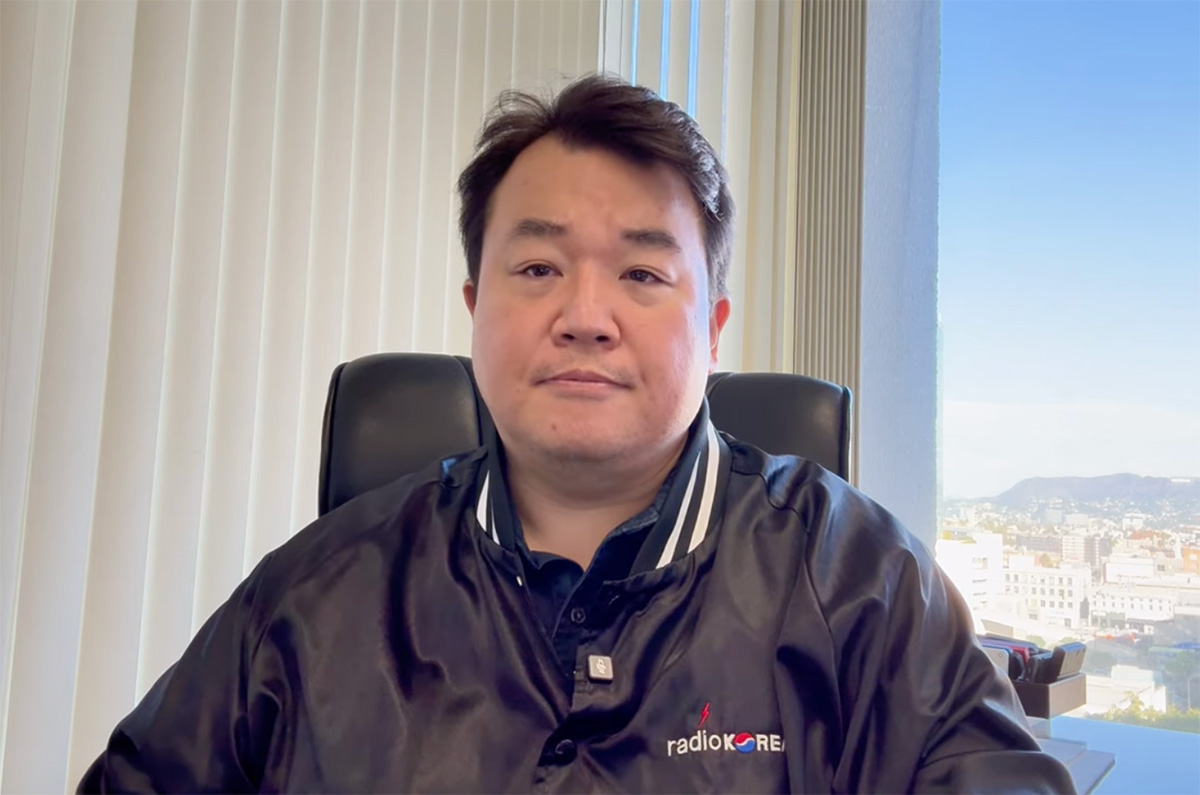
On Monday, Nov. 3rd, Radio Korea aired its regular morning talk show program, where one of its hosts, Julie An, discussed her lack of support for the LGBTQ+ community, citing her religious beliefs. She also went on to comment that gay people spread HIV and AIDS, and that conversation therapy — which has been linked to PTSD, suicidality, and depression — is a viable practice. Clips of this have since been taken down.
Radio Korea offers Korean language programming to engage local Korean American and Korean immigrant community members. Its reach is broad, as Los Angeles is home to the largest Korean population in the U.S, with over 300,000 residents. As An’s words echoed through the station’s airwaves, queer Korean community members took to social media to voice their concern, hurt, and anger.
In a now-deleted Instagram post, attorney, activist, and former congressional candidate David Yung Ho Kim demanded accountability from the station. Writer and entertainer Nathan Ramos-Park made videos calling out Radio Korea and An, stating that her comments “embolden” people with misinformation, which has the ability to perpetuate “violence against queer people.”
Community health professional Gavin Kwon also worries about how comments like An’s increase stigma within the Korean immigrant community, which could lead to increased discrimination against queer people and their willingness to seek health care.
Kwon, who works at a local clinic in Koreatown, told the Blade that comments like An’s prescribe being gay or queer as a “moral failure,” and that this commonly-held belief within the Korean immigrant community, particularly in older generations, strengthens the reticence and avoidance clients hold onto when asked about their gender or sexual orientation.
“When you stigmatize a group, people don’t avoid the disease — they avoid care,” Kwon explained. “They avoid getting tested, avoid disclosing their status, and avoid talking openly with providers. Stigma pushes people into silence, and silence is the worst possible environment for managing any infectious disease.”
For weeks, Radio Korea did not offer a direct response to the public criticism. Its Instagram feed continued to be updated with shorts, featuring clips of its various hosts — including An.
On Friday, Radio Korea CEO Michael Kim released an official statement on the station’s YouTube page. In this video, Kim stated that An’s comments “included factual inaccuracies” and that the station “does not endorse or share the personal opinions expressed by individual hosts.” Kim also stated that Radio Korea “welcomes members of the LGBT community to share their perspectives” in order to deepen understanding through dialogue.
Afterwards, Kim continued that though he acknowledges the “pain” felt by queer community members, he concluded: “I don’t think Radio Korea needs to apologize for what was said any more than Netflix should apologize for what Dave Chappelle says, or any more than Instagram or TikTok should apologize for what people say on their platforms.”
Kim then offered a justification that An’s statements were “not part of a news report,” and that he was “disappointed” that David Yung Ho Kim, specifically, had been vocal about An’s comments. Kim stated that he was the first person to interview David in 2020 during his congressional campaign, and that he had provided the candidate a platform and opportunity to educate listeners about politics.
“After all these years, the support Radio Korea has given him,” said Kim, “the support I personally gave him, even the support from other Radio Korea members who donated or even volunteered for him — he dishonestly tried to portray Radio Korea as being an anti-gay organization.”
Kim went on to criticize David’s purported “hurry to condemn others,” and also questioned if David has disowned his father, who he states is a pastor. “What kind of person is David Kim, and is this the kind of person we want in Congress?” Kim asked viewers, noting that Koreatown is “only about three miles from Hollywood, and some people just like to perform.”
At the end of the video, Kim stated that his duty is to guard the legacy of the station. “My responsibility is to protect what was built before me and ensure that Radio Korea continues serving this community long after today’s momentary controversies disappear,” Kim said.
For community members and advocates, this response was unsatisfactory. “The overall tone of the statement felt more defensive than accountable,” Kwon wrote to the Blade. “Instead of a sincere apology to the LGBTQ+ community that was harmed, the message shifts into personal grievances, political dynamics, and side explanations that don’t belong in an official response.”
Kim’s portrayal of the criticism and calls to action by community members as a “momentary controversy” paints a clearer picture of the station’s stance — that the hurt felt and expressed by its queer community members is something that will simply pass until it is forgotten. An continues to be platformed at Radio Korea, and was posted on the station’s social media channels as recently as yesterday. The station has not outlined any other action since Kim’s statement.
Kristie Song is a California Local News Fellow placed with the Los Angeles Blade. The California Local News Fellowship is a state-funded initiative to support and strengthen local news reporting. Learn more about it at fellowships.journalism.berkeley.edu/cafellows.
-

 Bars & Parties4 days ago
Bars & Parties4 days agoSoCal queer singles come together as we celebrate LA’s Top Eligible LGBTQ Singles at the Abbey this Thursday!
-
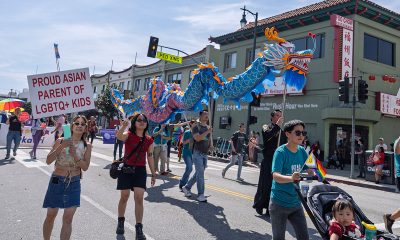
 Features4 days ago
Features4 days agoFrom the Desk of AJSOCAL: How the QTAPI community celebrates Lunar New Year
-

 Commentary5 days ago
Commentary5 days agoAre we done with ‘Drag Race?’
-

 Puerto Rico4 days ago
Puerto Rico4 days agoBad Bunny shares Super Bowl stage with Ricky Martin, Lady Gaga
-

 Theater3 days ago
Theater3 days ago‘Incitation to the Dance’ asks what happens to love when a younger man cuts in
-

 Philippines3 days ago
Philippines3 days agoPhilippines Supreme Court rules same-sex couples can co-own property
-

 New York3 days ago
New York3 days agoPride flag removed from Stonewall Monument as Trump targets LGBTQ landmarks
-
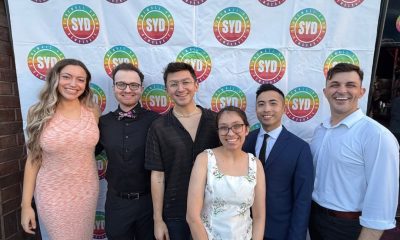
 Los Angeles2 days ago
Los Angeles2 days agoStonewall Young Democrats bounces back from “quiet year” with Hero Awards
-

 Florida3 days ago
Florida3 days agoDisney’s Gay Days ‘has not been canceled’ despite political challenges
-

 Italy4 days ago
Italy4 days agoOlympics Pride House ‘really important for the community’

